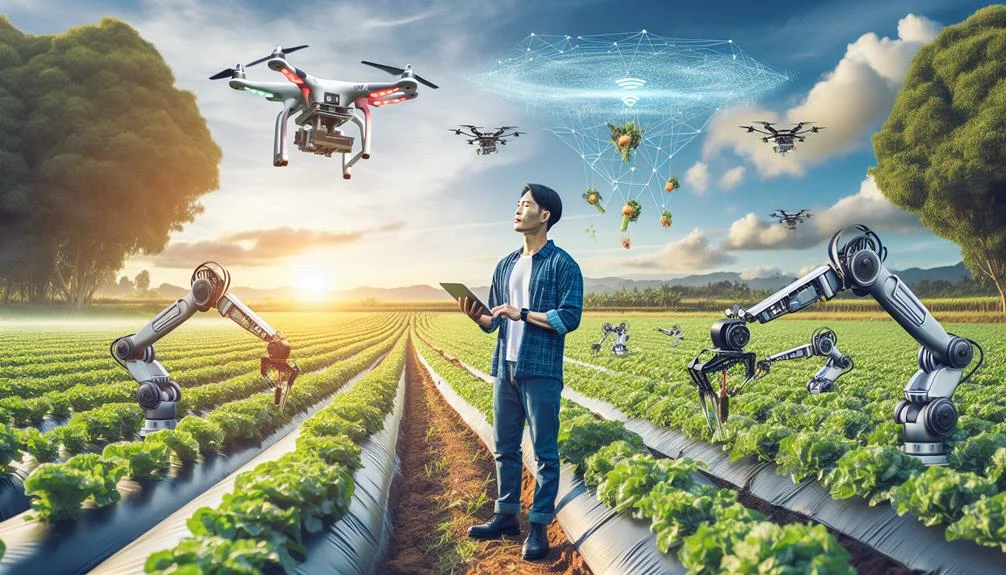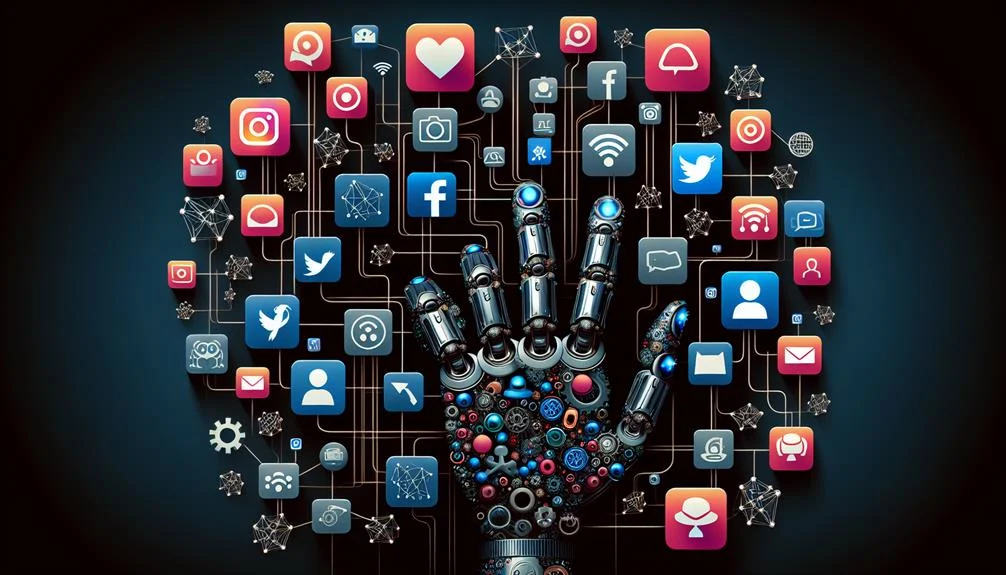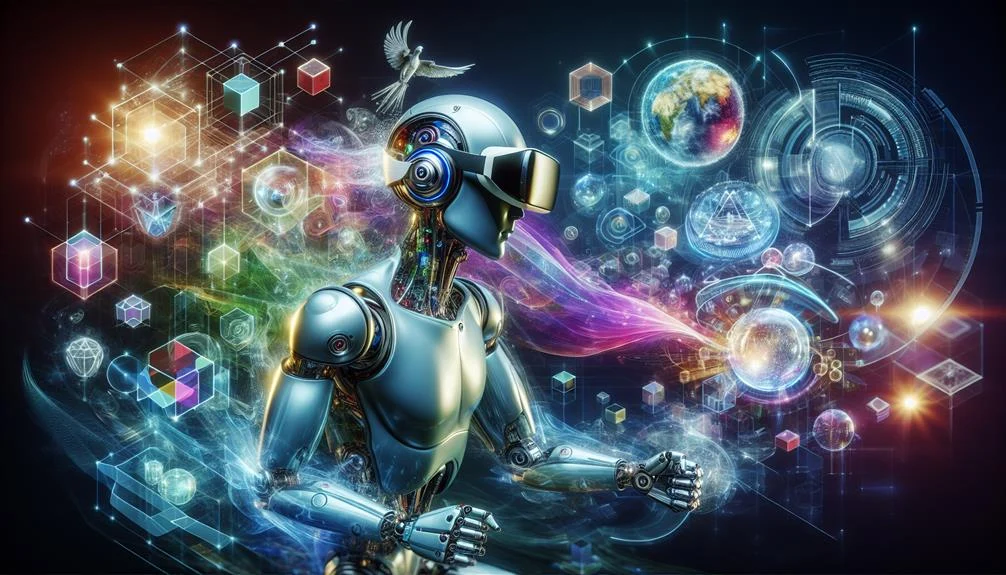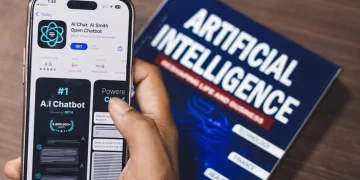The applications of Artificial Intelligence(AI) influences various sectors with diverse results. In e-commerce, it personalizes shopping experiences and aids fraud prevention. In education, AI facilitates smart content creation and personalized learning. Healthcare utilizes AI for diagnosis accuracy and predictive patient care, while applications in agriculture include crop management and sustainability. AI enhances social media user interaction and safeguards platforms. In gaming, it accentuates immersive gameplay and unpredictable environments. Finance harnesses AI for fraud detection, trading, underwriting, and risk assessment.
Main Points
- AI revolutionizes e-commerce through personalized shopping experiences and targeted advertising.
- In education, AI automates administrative tasks and personalizes learning experiences.
- In healthcare, AI is used in medical diagnostics, predictive analytics, and personalized medicine.
- AI streamlines agricultural operations, aids in livestock management, and promotes sustainability.
- AI enhances gaming experiences, revolutionizes finance and trading, and improves security on social media platforms.
The Applications of Artificial Intelligence in E-Commerce
The integration of Artificial Intelligence in E-commerce has revolutionized the industry, offering personalized shopping experiences based on user preferences and behavior. AI in E-commerce is the driving force behind such personalized shopping, with algorithms studying buying patterns, browsing history, and customer preferences to deliver tailor-made product recommendations and promotions.
AI-powered assistants play a crucial role in enhancing customer satisfaction. They provide real-time support, promptly address customer queries, and make suitable product recommendations. These virtual assistants, with their 24/7 availability, have transformed customer service, creating a smoother, more personalized shopping journey.
Fraud prevention is another important area where AI has made substantial contributions. AI algorithms can detect suspicious activities, initiate preventive measures, and thereby reduce fraudulent transactions significantly. This application of AI not only safeguards the company’s revenue but also boosts customer confidence in the platform.
AI also empowers e-commerce platforms with targeted advertising and customer segmentation. It analyzes vast amounts of customer data, enabling businesses to tailor their marketing strategies more effectively. Such targeted advertising reaches specific audiences with relevant products, while customer segmentation aids in creating more focused marketing campaigns. Overall, AI’s integration into E-commerce has greatly elevated the shopping experience for consumers and boosted the industry’s efficiency.
The Applications of Artificial Intelligence in Education

Bridging the gap between technology and education, Artificial Intelligence has emerged as a transformative force in the educational landscape, automating administrative tasks, personalizing learning experiences, and facilitating smart content creation. AI in Education has markedly reduced the workload of educators by automating administrative tasks, thereby allowing them to focus more on teaching and mentoring students.
In personalized learning, AI has proven instrumental in catering to individual student needs. It offers personalized feedback and recommendations based on student performance data, thus enhancing academic outcomes. Additionally, AI-powered voice assistants provide instant support to students, augmenting their learning experience by offering immediate responses to their queries.
Smart content creation, another application of AI, empowers educators to develop engaging educational materials tailored to the needs of their students. This not only guarantees effective teaching but also fosters greater student engagement. In addition, AI-driven adaptive learning platforms leverage collected student data to provide enriched, personalized learning experiences.
The Applications of Artificial Intelligence in Healthcare

In healthcare, Artificial Intelligence (AI) has demonstrated transformative potential.
From elevating precision in medical diagnostics to aiding the development of AI-powered prosthetics and pioneering personalized medicine, the implications of AI are far-reaching.
AI in Medical Diagnostics
Artificial intelligence in medical diagnostics has revolutionized the healthcare industry by greatly improving the accuracy and speed of disease detection. Machine learning algorithms analyze medical scans, offering early diagnosis and enabling the creation of personalized treatment plans.
AI’s predictive analytics capability utilizes historical medical data to anticipate future health outcomes, streamlining patient care. It has also made strides in cancer cell identification, which is essential for prompt and effective treatment.
AI’s role in medical imaging has enhanced disease detection, providing detailed insight into patients’ health conditions. The speed and accuracy offered by AI in medical diagnostics not only improve patient outcomes, but also contribute to the overall advancement of the healthcare sector.
AI-Powered Prosthetics Development
AI has shown remarkable potential in the development of prosthetics. Advanced algorithms enable artificial limbs to mimic natural movements and greatly enhance mobility for amputees. These AI-powered prosthetics incorporate sensors and actuators that respond to muscle signals, enabling a more intuitive control and reducing cognitive load.
Additionally, machine learning algorithms are used to adapt to the user’s unique movements, improving functionality over time. This personalized and precise control has the potential to revolutionize rehabilitation, enhancing user comfort and overall quality of life.
Therefore, the integration of AI in prosthetics development is a promising leap towards a future where technology and healthcare intersect to offer improved patient outcomes.
AI in Personalized Medicine
Artificial intelligence emerges as a potent tool for analyzing individual patient data, thereby facilitating the creation of tailored treatment plans. Machine learning algorithms enable AI in personalized medicine to predict patient responses to specific medications, enhancing the efficiency of treatment strategies.
AI-enabled diagnostic tools can identify genetic markers, leading to more precise personalized healthcare interventions. These developments have the potential to greatly improve patient outcomes and drastically reduce healthcare costs.
The Applications of Artificial Intelligence in Agriculture

In agriculture, artificial intelligence plays a pivotal role, streamlining operations such as crop irrigation, fertilization, and pesticide application through data-driven insights. These insights, derived from sophisticated data analysis, enable AI in Agriculture to optimize farming practices, leading to increased yield and efficient use of resources.
Agricultural robots, imbued with AI capabilities, are redefining traditional agricultural methods. These autonomous machines can accurately identify crop diseases and predict pesticide needs, allowing for early intervention and avoiding significant crop losses.
AI’s role extends to livestock management. Cutting-edge AI technology can classify livestock emotions, a groundbreaking advancement that promotes animal welfare. This emotional recognition aids in identifying distressed animals, ensuring timely attention and care.
AI also contributes to sustainability in agriculture through efficient irrigation. By analyzing multiple data points such as soil moisture, weather patterns, and plant water needs, AI can recommend precise irrigation schedules. This not only conserves water but also promotes crop growth.
The Applications of Artificial Intelligence in Social Media

Artificial Intelligence’s application within social media:
- Personalizing user experiences
- Detecting fake accounts
- Content recommendation algorithms
AI technology not only enhances the user’s interaction with the platform through customization but also safeguards the integrity of the platform by identifying fraudulent activity. Additionally, it utilizes sophisticated algorithms to recommend content that aligns with a user’s preferences and behavior, refining the overall user experience.
Personalizing User Experiences
Harnessing the power of artificial intelligence, social media platforms have revolutionized the way they personalize user experiences. They use complex algorithms to analyze user data and recommend content that aligns with individual preferences and behaviors. This personalization is achieved through the detailed examination of user behavior, enabling tailored suggestions that enhance user engagement.
AI-driven sentiment analysis allows businesses to comprehend customer feedback. This optimization of engagement strategies is based on user emotions. AI not only provides personalized content but also contributes to fraud detection by identifying malicious activities and ensuring a safe online environment.
The power of AI in social media extends beyond mere recommendations, forging a pathway for an unparalleled, personalized user experience.
Detecting Fake Accounts
Moving beyond personalized user experiences, artificial intelligence also plays a pivotal role in maintaining the integrity of social media by accurately detecting and eliminating fake accounts. AI algorithms are utilized by social media platforms to analyze user behavior patterns, content interactions, and account activity. By doing so, these systems can effectively identify suspicious accounts that breach platform rules.
The impact of this AI application is significant, helping to reduce misinformation, spam, and fraudulent activities. Therefore, AI not only helps to enhance security but also to uphold authenticity on these platforms. Consequently, social media companies increasingly rely on AI to guarantee a trustworthy environment for users, demonstrating the extensive potential of these technologies.
Content Recommendations Algorithms
AI-powered algorithms have emerged as a transformative tool in social media. They meticulously analyze user behavior to suggest content that aligns perfectly with individual preferences, thereby enhancing user engagement and platform usage.
These algorithms not only improve the user experience by offering personalized content but also serve as a catalyst for targeted advertising. By evaluating user interactions, likes, and other behavioral markers, AI algorithms can accurately predict and present content that resonates with users’ interests and demographics.
This strategic alignment of content fosters greater user retention and drives revenue optimization for social media platforms. Therefore, the application of content recommendation algorithms exemplifies how AI can greatly augment user engagement and experience.
The Applications of Artificial Intelligence in Gaming

In gaming, artificial intelligence plays a vital role, enabling realistic non-player character (NPC) behavior simulation that greatly enhances the immersive quality of gameplay experiences. AI in gaming has revolutionized the way we play, creating a more interactive and engaging experience for players.
AI’s ability to predict human behavior has been instrumental in enhancing game design. The introduction of AI systems like ‘Director AI‘ has allowed for a more dynamic and unpredictable gaming environment. Consequently, the player’s actions dictate the game’s response, leading to:
- Personalized experiences tailored to the player’s style and preferences
- Adaptive experiences that change and evolve based on player interactions
- Optimization of game difficulty and challenges based on player skill levels
Moreover, real-time obstacle sensing has been a game-changer for player engagement. By detecting and responding to in-game obstacles in real time, AI creates an environment that constantly challenges the player, thereby maintaining a high level of engagement.
The Applications of Artificial Intelligence Use in Finance and Trading

In the financial sector, artificial intelligence has made substantial strides in transforming various aspects of finance and trading, from fraud detection to algorithmic trading and consumer profiling.
Algorithmic trading systems are now utilizing AI for fast-paced, efficient trading decisions that benefit both large and small investors. The integration of machine learning by online lenders has revolutionized underwriting, enhancing accuracy and risk assessment capabilities.
AI also plays a pivotal role in combating financial crimes. By monitoring behavioral patterns and detecting anomalies, AI provides an effective solution to identify and prevent fraudulent activities. Consumer profiling has been greatly improved by AI. Major banks, like UBS and Deutsche Bank, leverage AI technology to provide personalized financial services, greatly enhancing customer experiences.
Conclusion
To sum up, the potential of artificial intelligence is vast, reaching into various sectors such as e-commerce, education, healthcare, agriculture, social media, gaming, and finance. The momentum it has gained indicates an unavoidable revolution in these fields, promising efficiency and innovation.
However, the irony lies in the fact that while AI mimics human intelligence, its successful implementation will largely depend on human acceptance, understanding, and ethical regulation.





